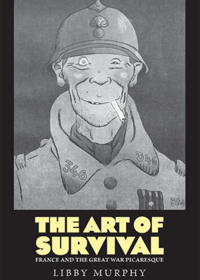
- Oberlin College
- Associate Professor of French, Chair
- Affiliation During NDIAS Fellowship: Oberlin College
- Residential Fellow (2010-2011)
- “The French Great War Picaresque“
Libby Murphy is an associate professor of French at Oberlin College. She teaches modern and contemporary French literature and specializes in advanced conversation, composition, and textual analysis. Her research interests center on French literature and culture of the First World War, the history of French journalism, and theories of the novel.
Professor Murphy has published articles on print culture and the First World War, on literary representations of the French Infantryman or /poilu/, and on the reception in wartime and postwar France of the films of Charlie Chaplin. She is currently working on a cultural history of the First World War that develops the literary mode of the picaresque as a conceptual framework for understanding the ways in which French novelists, journalists, graphic artists and cultural critics attempted to make sense of the Great War.
She is the past recipient of a B. Wade and Jane B. White Junior Faculty Fellowship in the Humanities from Oberlin College (2009-2010) and fellowships from the American Philosophical Society (2009-2010) and the Camargo Foundation, Cassis, France (Fall, 2009).
Publications
-
The Art of Survival: France and the Great War Picaresque
Yale University Press, 2016

The First World War soldier has often been depicted as a helpless victim sacrificed by a ruthless society in the trenches of the Western Front. In fact, Libby Murphy reveals, French soldiers drew upon a long-standing European tradition to imagine themselves not as heroes or victims but as survivors. Murphy investigates how infantrymen and civilians attempted to make sense of the war while it was still in progress by reviving the picaresque, a literary mode in which unheroic protagonists are forced to fend for themselves in a chaotic and hostile world. By examining works by French and European novelists, journalists, graphic artists, cultural critics, and filmmakers—including Charlie Chaplin—Libby Murphy shows how the rich tradition of the European picaresque was uniquely appropriate for expressing anxieties provoked by modern, industrialized warfare.